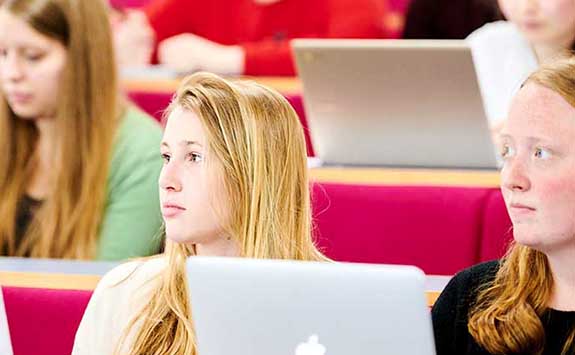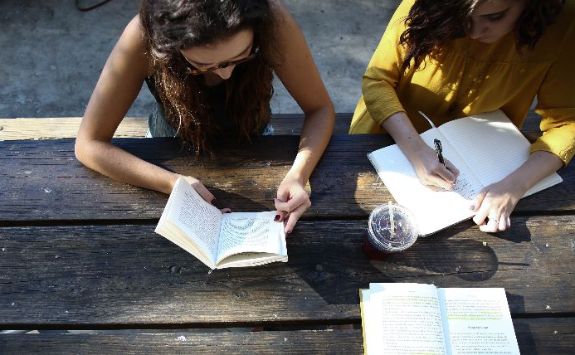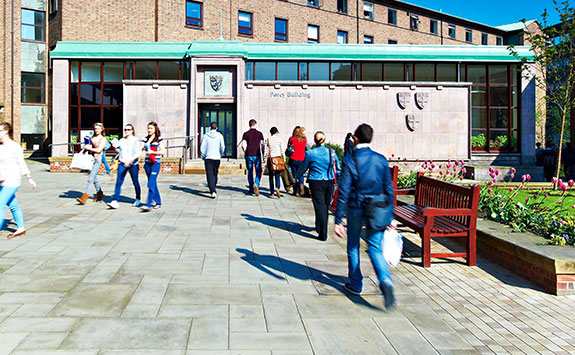QV31: English Literature and History
Welcome to English Literature and History at Newcastle
With this interdisciplinary degree, you are working in not one, but two brilliant Schools. You have bespoke modules that are co-taught by historians and literary scholars. Your degree is hosted by us in the School of English but you also will be members of the School of History.
You will have a rich and well-rounded academic experience on a degree tailored to the two subjects you love. We hope you are looking forward to it!
On this page you will hear from lecturers who teach on the degree and students taking it right now. The pages cover:
- How we teach English Literature and History here at Newcastle;
- How your degree is structured and what you do on each year of the degree;
- A deep dive into two students' passion projects;
- Our dedicated wellbeing and academic support and Beth's advice for new first years;
- Support for you if you have extra challenges such as a disability or caring responsibilities.

Sorry, you need JavaScript to view this video
Studying English Literature and History in your first year
You take six modules. We ask you to take Evidence and Argument from History and Doing Criticism from Literature as your required modules in first year. The texts for Doing Criticism are Muriel Rukeyser's poem, The Book of the Dead, John Lyly's play, Galatea, and Hermann Melville's short story 'Bartleby, the Scrivener'. These introduce, develop and strengthen the skills of a historian and literary critic. You can take two modules from History and two from English Literature but we give you the option of substituting one 'outside' module in another subject area.
In second year
In second year, you are required to do one specialist module designed for you and you choose five modules (two each from History and from English and a free choice with your fifth). It is simple, for example, to combine modules in the history and literature of the same time-period because Stage 2 modules in English are organised by period: Renaissance Literature, Victorian Literature, Modernist Literature and so on.
A feature of this degree is your Stage 2 specialist module. It is called Independent Research Project in Literature and History. It is co-taught by a historian and a literary critic who co-lead your classes. This module is only for students on this degree. The aim of the module is to ensure you have an opportunity to combine your knowledge and ability in both subjects.
In third year
This builds to your dissertation module at Stage 3 which is again just for students on this degree. It is focussed on your own intellectual interests. Your dissertation will be co-supervised by a historian and a literary scholar and your supervisors will work with you to shape a project driven by a topic you are fascinated by and that allows you to draw on your unique understanding of both disciplines.
You also choose a further four modules from Literature and from History, but one of these four could be an outside module from another subject area if you wish. You have a huge range of choice here from the histories and literatures of the medieval period to the present day.
Getting to know people
You will meet lots of new people in your lectures, your seminars and your study groups.
Study groups are small groups of students asked by their seminar tutor to meet up regularly outside the seminar to discuss their reading and report back to the seminar. These groups are great for getting to know your fellow students. You will also in the first week meet a peer group of new students with a second or third year who will be your Peer Mentor.
You can also meet your fellow students and pursue shared interests by joining the History Society, English Society, Creative Writing Society, the Theatre Society or writing for The Courier.
The Students’ Union hosts events, gigs and has over 200 societies to choose from: perhaps you might like to join the very popular Llama, Alpaca and Goat Society or the Yoga Society?

Sorry, you need JavaScript to view this video
Academic Support for Students
If you need extra support to ensure you can fulfil your potential at university, we have services and people you can draw on throughout your degree here.
All students can avail of two Fellows of the Royal Literary Fund who are professional writers based in the School of English. The RLF fellows are advisors dedicated to developing your writing. You can email them and have one-to-one appointments where you can develop and refine your writing style and argumentation. Students (and staff) have found their guidance extremely helpful in shaping their writing. You will also receive dedicated academic support from personal tutors and library staff in addition to the advice, guidance and support of your lecturers and seminar leaders.
The Library also offers a huge range of resources you can explore at your own pace, drop-in sessions, and advice on how best to use all the academic resources available to you.

Who can I contact if I need support for my wellbeing?
The School has a colleague dedicated to our students' welfare. Kirsty Robson is a trained social worker who now supports our students' wellbeing. Kirsty explains:
My role as the Student Wellbeing Advisor is to act as a point of contact within the School, to support students in accessing appropriate support and resources to improve and maintain their personal wellbeing. This can be in relation to a wide range of circumstances and difficulties.
I offer confidential, one-to-one appointments, a listening ear, advice and support. I can make referrals to more specialised teams within the University, such as Counselling, Finance, and Disability Support.
The Student Wellbeing Advisor role is part of the wider Student Health and Wellbeing Services team who offer a wide range of specialised support to students regarding their personal wellbeing. Students can refer themselves directly to that team or can be supported to do this via the Student Wellbeing Advisor.’
I offer confidential, one-to-one appointments, a listening ear, advice and support.
Support for Disability and Caring Responsibilities
Student Support Plans
Student Support Plans (SSPs) outline adjustments you may need for your studies or assessments because of particular physical or mental health issues with which you have been diagnosed. With your consent, these plans are shared with the academics teaching you so they are aware of your needs in class and during assessment periods.
If you have a pre-existing condition and if you have included that information on your UCAS form, Wellbeing Services will receive that information and be in touch with you once you join us.
If it was not included, you can email disabilityadvisor@ncl.ac.uk to request an appointment at any time in the run up to the September you are hoping to commence study with us. If you have had an issue recently diagnosed then there are a range of people in the School you can contact: our dedicated Student Wellbeing Advisor, Kirsty Robson, your Personal Tutor whom you meet in Induction Week or the First Year Senior Tutor. If you prefer you can email disabilityadvisor@ncl.ac.uk directly yourself to make an appointment to set up a support plan or revise an existing one.
Carer's Passport
If you give unpaid care to an adult or child, you are a carer. These demands on your time can be difficult to manage and a Carer's Passport enables you to ask for flexibility in your studies.
Cost-of-Living
We are acutely aware of the cost-of-living crisis and in particular its impact on students. Please do not hesitate to get in touch if you are experiencing financial struggles at any point during your degree or if you simply want some advice on budgeting or managing money from the outset of your degree. We are here to help you.

To note
Our teaching is informed by research. Course content may change periodically to reflect developments in the discipline, the requirements of external bodies and partners, and student feedback. Please rest assured we make all reasonable efforts to provide you with the programmes, services and facilities described. However, it may be necessary to make changes due to significant disruption, for example in response to Covid-19.
Full details of the modules on offer will be published through the Programme Regulations and Specifications ahead of each academic year. This usually happens in May.
To find out more please see our terms and conditions..
